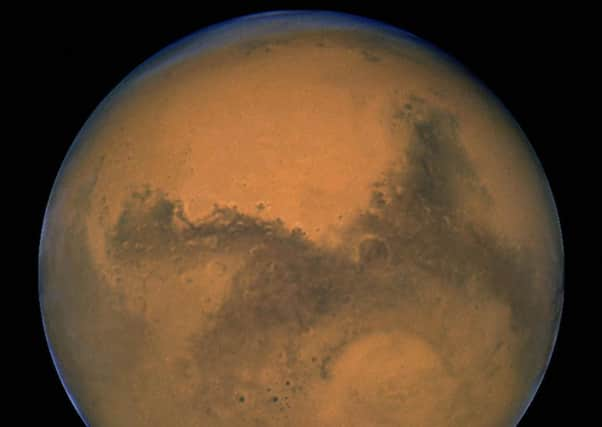When will a manned mission reach Mars?


Professor Martin Lee, head of the school of Geographical and Earth Sciences at the University of Glasgow gave his predictions on when a manned mission will reach the red planet.
He also said scientists believe there “may well” by life on Mars.
Advertisement
Hide AdAdvertisement
Hide AdSpeaking exclusively to The Scotsman, professor Lee said: “The current aim is to reach Mars between 2040 - 2050.


“Travel time to Mars would take between nine months to a year and one of the big problems is the whole idea of how people would cope being in a confined space for that long.
“At the moment, studies are ongoing, with people being kept in small chambers to see how they cope - that is one human psychological problem we need to solve.
“Also those travelling would have to take all their own food, water and oxygen supplies, all of which are heavy, enough to last to get there and for the journey back.
“They are also looking at the question - is it acceptable for people to go there but not to come back again? getting there is only half the problem, and I’m not sure it is such a good idea.”
Professor Lee and his team at the University of Glasgow analyse meteorites that have landed on earth from Mars.
Earlier this week NASA reported the electrifying news that liquid water is flowing on Mars.
And Prof Lee’s team have published a research paper examining minerals contained in the meteorites that suggest hot springs may have recently formed on the planet.
Advertisement
Hide AdAdvertisement
Hide Ad“Hot springs are a good place to search for life, and there may well be life on Mars,” Prof Lee explained.
“We know that life evolved on Mars’s early history. Some people believe that Mars life is buried deep underground, that may rise to access the hot springs.”
Prof Lee said one potential challenge is if life is found, where to take back and examine samples.
He said: One challenge is looking at how to protect earth from potential martian bugs.
“One research project we are currently involved with is looking at how we could bring back samples from Mars to look at. Where would be open it? the moon? the international space station?
“If you do contaminate earth and everyone dies, then it wouldn’t look to great on your CV,” he added.